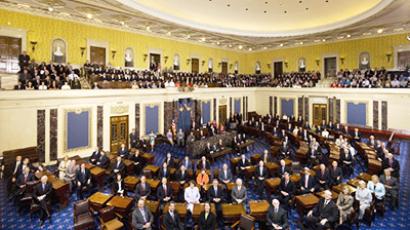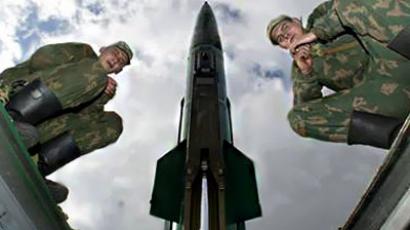Russia tackles full plate of issues at G-8 Summit in France

President Dmitry Medvedev arrived in the affluent Normandy resort of Deauville, France for a two-day summit in which turmoil in the Arab world, as well as the controversial missile defense shield will rank high on the agenda.
Of primary importance as far as Russia is concerned, is the long-standing question of European-based missile defense, which the United States is planning to build in Eastern Europe, on the very border with Russia.Moscow has said in the past that the system would pose a threat to its national security.Although there seemed to be a major breakthrough during the Russia-NATO summit in November in Portugal, NATO appears to be hesitant on full-scale cooperation with Russia, a move that could provoke nothing short of another arms race. Following their talks in Deauville, President Barack Obama said the US and Russia are committed to finding a "missile defense configuration" that meets the security needs of both countries. Moscow has warned its NATO partners in the past that without full cooperation with Russia on the missile defense system, the threat of an arms race can not be discounted.Meanwhile, Russian Ambassador to NATO, Dmitry Rogozin, summarizing the results of an ambassadorial meeting of the Russian-NATO Council on Wednesday, criticized European leaders for waiting until "big brother" calls the shots."NATO is waiting for something extraordinary to be achieved at the Deauville negotiations of the Russian and U.S. presidents," he said. "It is a pity that national delegations of the alliance once again expect an OK from 'the big brother' in the project to be implemented on the European land."Rogozin suggested that Europe may underestimate what may happen if a mutually workable agreement on a missile defense system fails to materialize."Naturally, Russian negotiators realize the significance of the Russian-U.S. format in the provision of strategic stability, and missile defense issues are directly related to that. Yet I wonder why Europe keeps hiding under the 'big brother's' back," he said.Now it remains to be seen if Obama will remain true to his pledge of cooperation. Given the American leader's failure to come through on other promises in the past, however, Moscow may be ultimately forced to address the reality of a missile defense system on its doorstep by other more unilateral means. This is an alternative outcome to the ongoing missile defense debate that Europe must carefully consider: Is it really worth alienating Russia to pursue a system that might not even work against enemies that do not exist? Containing the Arab SpringThe infectious movement known as the “Arab Spring,” which has aroused a social awakening across parts of the Middle East and North Africa, will receive its due share of attention from the assembled leaders.Egypt and Tunisia have already witnessed the collapse of their governments, while violent public uprisings in Syria, Yemen and Bahrain are posing a challenge to autocratic rule, as well as shaking up the geopolitical calculus in the volatile region.One of the crucial questions the leaders will consider is how to turn the Arab and African protesters’ modest gains into a fledgling recovery. Egypt, for example, which was largely dependent on tourist revenue, is now witnessing a surge in crime rates as the tourists are opting for less unpredictable places to spend their cash. Many investors as well have taken to their heels in the aftermath of the crisis.A source in the Russian delegation accompanying President Medvedev said Russia will help revitalize legitimate governments, not unpredictable regimes. "We will speak in favor of systemic measures to help (Egypt and Tunisia, and other affected nations), not specific regimes, for measures aimed at modernization of the economy, increasing employment, creating new jobs, and equal non-discriminatory trade conditions," the source told reporters in response to a question as to whether Russia will follow the example of the U.S. by stating its readiness to provide financial support to the new governemnts in Egypt and Tunisia."We support stability, not regimes," the source said, as quoted by Interfax, adding that Russia has not curtailed a single assistance program within the G8."Russia has forgiven more debt than many countries in terms of the percentage ratio of the aggregate national revenue and forgiven debt," he continued."The issue is how the provided assistance is used," the delegation member, speaking on condition of anonymity, said, recalling that the Americans "burned billions of dollars in Egypt by providing Mubarak with weapons and training Egyptian military" before declaring their assistance to the new regimes, including in Egypt.Libyan meltdown Meanwhile, Russia has repeatedly expressed its concern over the handling of the Libya crisis, where NATO forces occasionally appear to be more of a threat to civilian life than the Libyan strongman they are protesting against, Muammar Gaddafi, who has ruled his North African nation for 42 years.On Tuesday, NATO unleashed a devastating air attack on Tripoli, targeting dozens of strategic sites in central Tripoli, in what seems to be a conspicuous endorsement for the anti-government rebels in their three-month long battle against government forces. Russian officials have warned that NATO is interpreting too liberally the UN resolution that calls for UN member states to take "all necessary measures" to protect civilians in Libya. The UN resolution did not provide conditions for taking sides in the conflict.In light of the challenges facing the entire region, leaders of Egypt, Tunisia and the Arab League will join the summit discussions. Several African leaders will also participate in a special meeting Friday.Meanwhile, Deauville itself appears to be involved in its own war, as 12,500-strong police force, backed by patrol boats and helicopters, has the entire Normandy town in lockdown mode. Drones overhead and missiles in a nearby forest attest to the extreme security presence.“Mobile and fixed police patrols were omnipresent, checking badges and directing traffic, but the French's army's "Harfang" drone flew silently overhead, and arrays of ground-to-air missiles were hidden in the woods,” Agence France Press reported.Meanwhile, the “anti-globalization” protesters that had been so prominent at other past economic summits in recent years were nowhere to be seen around this bourgeois resort town, opting to hold demonstrations in Paris.In addition to the G8 meetings, the Russian leader will hold bilateral meetings with his counterparts, including those with the American president, prime ministers of the United Kingdom, Japan and with Germany's chancellor. Medvedev will have a meeting with the host of the summit, France's president Nicolas Sarkozy, on the opening day of the summit. The Russian President and Sarkozy "will discuss the present state and future of the Russia-France relations, which have reached the level of strategic partnership," aide of Russia's president, Sergei Prikhodko, said.Meanwhile, Medvedev and Sarkozy have agreed to conclude a contract on the purchase of four Mistral-class helicopter carriers from Russia."We have come to a final agreement that this contract will be signed in 15 days," the French president said following talks with Medvedev. "Two helicopter carriers will be built in France and two more in Russia.""Our talks have been completed," Medvedev confirmed. "This [the Mistral deal] will help promote our ties further."The Mistral multifunctional helicopter carrier carries 16 helicopters (including eight landing helicopters and eight assault helicopters). Six helicopters can be placed on the ship's deck simultaneously.In addition to the additional sea power, the deal between the French and Russian leaders will add job growth at a time when the economy is struggling to extract itself from the global recession.Japan and the Tsunami AftermathThe G-8 leaders adopted a draft joint statement on Japan, which suffered a major catastrophe following a 9.0 magnitude earthquake on March 11. The massive temblor triggered a tsunami, which, in addition to leading to the deaths of thousands of people, severly damaged Fukushima Nuclear Plant. The document says the governments of the G8 nations are ready to offer all the necessary help to Japan.The G8 leaders also expressed solidarity with the families of those killed in the natural calamity. At the same time, they agreed it is necessary to toughen security standards at all nuclear facilities.The overall cost of the disaster could exceed $300 billion, making it the most expensive natural disaster on recordRobert Bridge, RT














